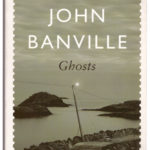Price and stock to confirme
Ed. Picador, 1998. Size 20 x 13 cm. State: Used, excellent. 244 pages
Ghosts, John Banville’s novel, conjures a world of wispy insubstantiality in which mysterious figures come together, drift apart, converse, ruminate, get on each other’s nerves, even go to the loo; everything, indeed, apart from actually spooking us.
Ghosts revisits the nebulous echoland of Eliot’s The Hollow Men, a place where one might feel the presence of ‘poor, pale wraiths pegged out to shiver in the wind of the world like so much insubstantial laundry, yearning towards us, the heedless ones, as we walk blithely through them’.
Banville is also revisiting scenes from his last novel, The Book of Evidence, in which a man is convicted for the murder of a young woman. Now, released from prison but still haunted by his crime, the man has fled to an unnamed island where, in the company of a professor of art history and his assistant, he has embarked on a study of the French painter Vaublin, alternating this with occasional duties as a narrator. Their sequestered calm is interrupted when a strange party of visitors fetches up on the island after their boat has run aground, from which the book’s action proceeds.
Ghosts reminded me not so much of a painting as a film, Last Year at Marienbad, Resnais’ enigmatic variations on a story about a couple trying to decide whether they had met each other the year before. The detached performances, interminable tracking shots and cultivated ennui feel loaded with significance, though puzzling over how significant proves about as useful as unpicking a bed sock, only rather less dramatic. So it is with Ghosts. Just once the perfect glacial surface of the prose is broken, in a sequence which follows the narrator on his release from prison into the cold comfort of a pub (where the drinkers are, predictably, ‘indeterminate types hunched over their pints in the furry grey gloom’).
From this lonely bar he telephones his wife, and a halting conversation just about gets going when his money runs out: ‘I gave her the number and hung up and waited. She did not call back. The absence of that ringing still tolls faintly in my memory like a distant mourning bell’. Here, at last, is a moment in which real flesh-and-blood frailty is exposed, a concentration of feeling that breaks clear of the novel’s pinched frame.

